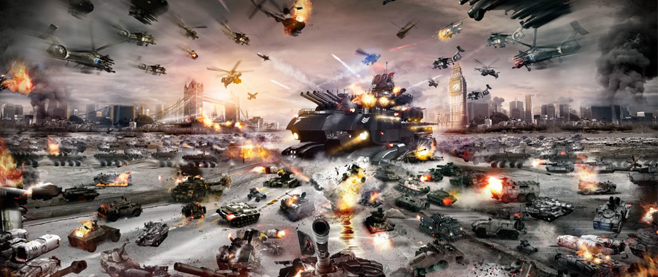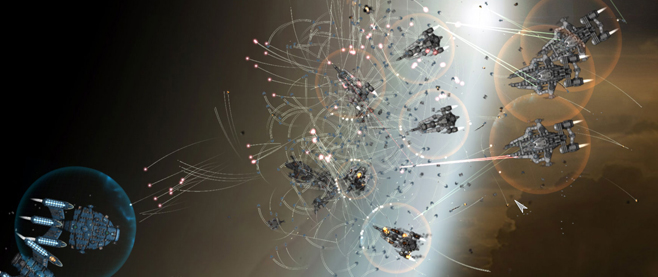
Watching Nations Fall
[wpcol_1half id=”” class=”” style=””]
in a data center, and your computer is just the client that is interfaced into the server. Another way of saying this is that your computer is a window through which you are seeing the game. This type of architecture is common for MMO games, as it allows for much larger numbers of users and helps with a bunch of anti-cheat challenges as well.
Unwinnable: What are some of the key features we can expect to see in the game?
D.L.: There are three big feature buckets:
1. Scale: Large scale co-op and competitive battles like you have never seen in an RTS game before, with lots of ways to team up with friends.
2. Persistence: Everything you do counts, but in the campaign mode and in the larger meta-game battles for territory. There will be thousands of players fighting for control of the world, and if you are part of a big assault or are keeping the base safe – what you do will matter.
3. Customization: This is both aesthetically and gameplay changing. What choices you make in building out your army, equipping it and upgrading units and abilities will be a big part of the strategy found in this game.
Unwinnable: How are you balancing the MMO aspects with the RTS aspects?
D.L.: We address balancing through a couple of methods. The first is via a smart matchmaking/rewards system that takes rank, skill, clan, group and other player preferences into account in the big competitive battles. The second is really about embracing the differences between newer and more veteran players and employing design concepts in which there is a symbiotic relationship between new players and veterans.
Unwinnable: How do you see the world and mechanics developing post-launch?
[/wpcol_1half] [wpcol_1half_end id=”” class=”” style=””]
D.L.: That’s very difficult to predict. First we’ll listen to our customers. We think of this as a service and, if there are particular features or needs that our customers have, we’ll want to address those.
Beyond that, we’ll certainly introduce new units, mods, areas, missions and new stories. Getting wilder, we could potentially release new factions – or even wilder still, persistent player bases and the like.
Unwinnable: End of Nations packs some serious visual firepower. What technology did you use to develop it?
D.L.: Everything you see is born from propriety tech created by our development partner Petroglyph or by our platform team here at Trion.
Unwinnable: Has it been difficult to scale End of Nations? Are there any specific things you have done or used to ensure the game will run on legacy machines?
D.L.: Yes and yes! It has been difficult and there are many things we’ve done to keep the barrier to entry as low as possible. Technically we have a really solid rendering engine that can scale the complexity of all the visuals down to different levels of detail appropriate for older machines, and we’ve made design and platform decisions that will offload many of the logic needs to the server. In this model the clients don’t need the entire world state in memory and/or have to calculate all the math, which really lowers the overhead on CPU and RAM.
Unwinnable: When all is said and done, what is the one core thing you hope to accomplish with End of Nations?
D.L.: There’s a bunch of little goals all tied into this, but at the core I want to see us deliver a game that finds fans who think it simply kicks ass!
———
[/wpcol_1half_end]





